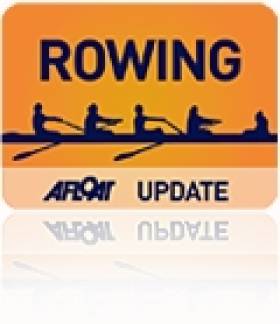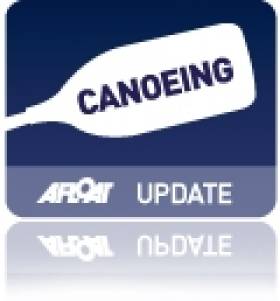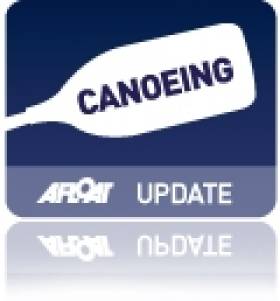Displaying items by tag: Slovenia
Rowing World Cup I in Bled, Slovenia
#rowingworldchampionships – Enjoy the sensations of a rower at the start, just before the rowing battle begins! In this video rowers talk about being at the startline, describing their emotions, the stage-fright, the goosebumps and about their mental preparation before the rowing battle begins.
Listen to the world class rowers Fabiana Beltrame (BRA), Barnabe Delarze (SUI), Pedro Fraga (POR), Kristine Putnina (LAT), Iva Obradovic (SER) and Llilijana Josic (SER).
The 2015 rowing season has started with World Rowing Cup in Bled, Slovenia. Tight racing resulted in the World Cup regatta points trophy being shared equally between China and Germany. Germany won four gold medals. These came in the blue riband men's eight race as well as the men's double sculls and men's and women's quadruple sculls. The men's double sculls saw former single sculling champion Marcel Hacker team up successfully with Stephan Krueger to create a potentially winning new 2015 combination.
Scoring the most number of medals overall was China. The Chinese came to Bled with a large team and they won gold in both the lightweight women's double sculls and the lightweight men's pair. China won silver and bronze in the women's pair after getting five of their six entered crews through to the final. But it was the Dutch pair of Olivia van Rooijen and Elisabeth Hogerwerf who earned the gold. China also took silver and bronze in the lightweight men's four.
Belarus won two gold medals, one by 42-year-old Ekaterina Karsten in the women's single sculls. The six-time Olympian Karsten was a last minute entry in the single after her doubles partner had to withdraw due to injury. Belarus was also successful with gold in the men's four.
As well as the women's pair, the Netherlands won a second gold medal in the lightweight men's double sculls. Brothers Tycho and Vincent Muda kept the lead in a close race to the line which saw the silver and bronze medals decided by less than a second.
Poland picked up six medals overall to finish third on the points table. Poland's medals included gold in the women's double sculls following an impressive performance by Magdalena Fularczyk and Natalia Madaj.
Overall 20 nations earned World Cup points.
The World Rowing Cup series now moves to Varese, Italy from 18-21 June 2015 for World Rowing Cup II. Before that, European nations will be competing in the European Rowing Championships in Poznan, Poland from 29-31 May 2015. Ireland will compete in Poznan.
The World Rowing Cup series was launched in 1997 and consists of a series of three events. The overall World Rowing Cup winners are determined after the third event. This year, the three stages of the series are Bled, Slovenia (9-10 May), Varese, Italy (18-21 June) and Lucerne, Switzerland (10-12 July), where Ireland will also enter a team.
Irish Student Dies On Slovenia Canoeing Trip
#Canoeing - The death of an Irish student on a canoeing trip in Slovenia is the second tragedy to befall a north Dublin college's adventure sports management course, as The Irish Times reports.
The young man, who has not yet been named, was canoeing on the Soca river as part of an official trip to Slovenia organised by Coláiste Dhulaigh in Coolock.
It's reported that the "accomplished and experienced" canoeist was paddling through a stretch of whitewater when his arm got stuck in the rocks.
Despite the best efforts of his fellow students to rescue and revive him, he was pronounced dead shortly after.
The incident comes five months after another student on the same course, 21-year-old Shane Murphy from Baldoyle, lost his life while kayaking with friends on the swollen River Inchavore.
The Irish Times has more on the story HERE.
Big Weekend for Ireland's Canoeists in Balkans
Eoin Rheinisch made a good start in the K1 qualification round at the Canoe Slalom World Cup in Slovenia.
The Kildare native - who is recovering from a shoulder operation - finished 10th in the heats, qualifying for yesterday's semi-finals where he finished in 28th place.
The Irish Times reports that he described the performance as encouraging.
“I enjoyed myself today and that was my goal,” he said.
In other action from Slovenia, Hannah Craig failed make the semi-final in the women’s K1, while Patrick Hynes and Ciaran Heurteau missed out in the men’s K1.
Meanwhile in Serbia, Salmon Leap's Jenny Egan set a new Irish women's record of 1m 55.9 sec in the 500m semis at the European Sprint Canoe Championships in Belgrade, the Evening Herald reports.
She went on to finish ninth in both the 5,000m final annd 200m B final.
Fellow Salmon Leap member Barry Watkins placed fourth in the 500m B final and eighth in the 1,000m B final.
































































